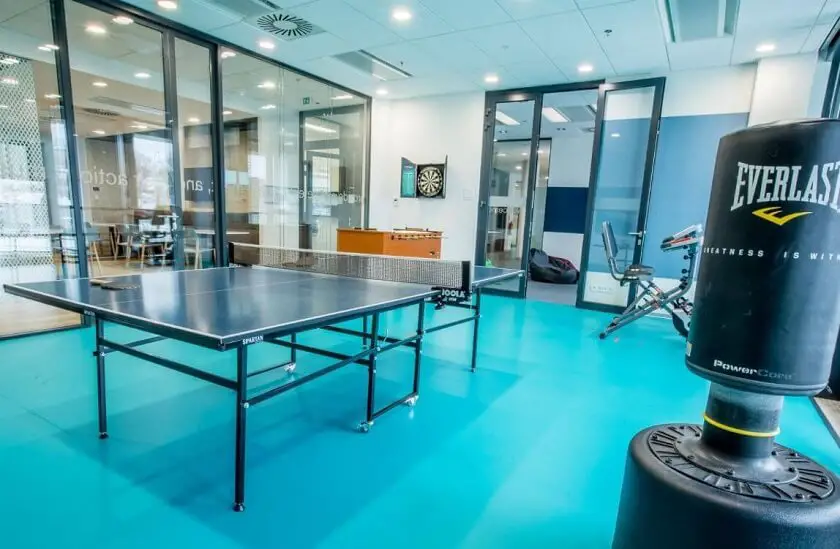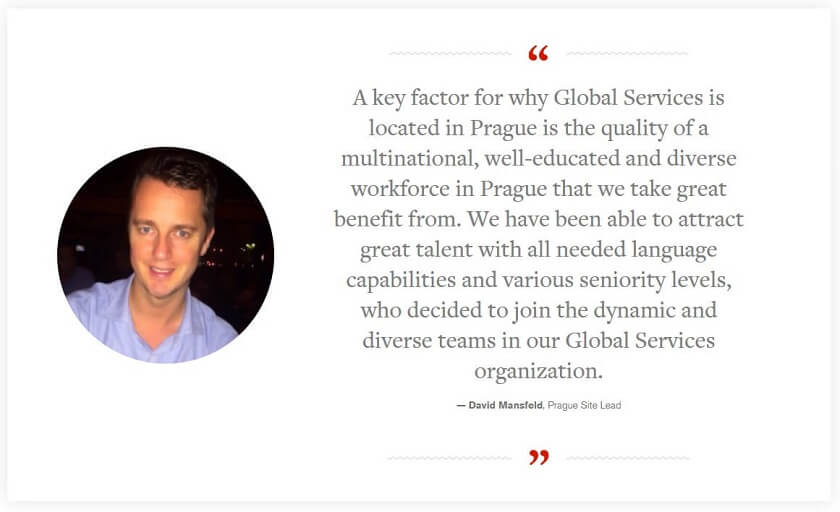One of the most prominent corporate employers in this country is JnJ, or to be precise, Johnson & Johnson office in Prague. JnJ Prague jobs listings often pop up on LinkedIn, Jobs.cz and many other career pages. So, it’s not surprising that many expats come across those jobs and find them tempting. Before applying for any open vacancy posted by this company, it’s good to know something about the hiring process, salary, atmosphere and career opportunities at JnJ Prague office. And that’s exactly what this in-depth interview with a former JnJ employee is going to give you – a lot of truth, and a bit of controversy. 😉 We changed his name here for a reason, after all!

PragueReferral (PR): Hi, Thomas, thank you for agreeing to share your on-the-job experience from JnJ. Let’s get straight into it. First things first… What is the hiring process like for jobs in Johnson & Johnson Prague Office?
Thomas: I’ve been hired through a referral, actually. My previous flat-mate was a Team Lead in HR department, not directly in Talent Acquisition (TA), but another team within HR. Before being referred like that, I tried applying to JnJ’s Global Services Center in Prague many-many times, and I never even got a call from them.
So, I think it’s fair to say that having a job referral contact really counts when it comes to openings at JnJ. On the other hand, it might be the case that the TA team paid attention to me only because it was a Team Lead who referred me. Because later, working as an entry-level employee at JnJ, I myself referred many people. Most candidates I referred didn’t even get a call from the TA team, and none got hired. So, maybe a Team Lead’s referral is viewed as more valuable by Talent Acquisition teams at JnJ. (PR note: join our job referral group on FB to find a relevant contact at JnJ)
Screening process for jobs at JnJ Prague
The hiring process for JnJ Prague jobs is pretty long. Before I even got to my first interview I had to go through 4 primary steps of the screening process:
- First, I had a call with an HR representative,
- Then I had an Excel test,
- Next, came a test in Accounting (I was referred for an Accounts Payable role),
- And then I had to pass a test that checked my logical thinking.
It’s nothing to be worried about – the tests are not too difficult, and the passing mark is only 50%. But if you don’t succeed at these tests the system won’t let your application to get to the next stage.
Interviews follow
Then came the interviews! And although all interviews went very well, in a nice atmosphere, as a simple conversation, there were quite a lot of them. Three interviews to be precise:
- The first one was with the HR,
- Another one with the Team Leader,
- And the last one with my Manager.
And how does the onboarding process go for JnJ Prague jobs? What was your experience in the first 3 months?
Thomas: When I started working for JnJ, I felt like a part of the team since day 1. They managed my training really well, and I had the support of my first Team Lead all the time, especially at the beginning. And it didn’t end there! I can say that I felt supported by my team and the department far beyond the initial onboarding period.

Let’s talk a bit about people. What was roughly the split between local and foreign employees?
Thomas: Here in Prague the JnJ team is quite mixed. Local Czechs certainly made more than 50% of the approx. 900 people working for the company. Nevertheless, it was a very international environment anyway. And even the locals were very welcoming and open-minded. I had colleagues from all over the world, at certain point my team-mates were from different countries in Europe and Asia, for example. Obviously, the internal language was English for everybody.
Do you know of any non-EU citizens who JnJ helped with their migration paperwork? (e.g. Czech visa sponsoring, work permit etc.)
Thomas: No, to be honest, I’m not aware of such cases. For example, we had a lot of Russian speakers from Russia, Ukraine, Uzbekistan and other countries. But they all came here as students and therefore they didn’t need any visa support for employment in Czech Republic. To be honest, from what I know most companies in Prague are not ready to go through all the paperwork required for sponsoring a visa. So, they typically hire those foreigners who are already here and can be employed.
Maybe they would put the effort for jobs that require some particular language skills that are hard to find in Czech Republic. For example, if they need somebody who speaks Turkish – it’s not very easy to find a Turkish speaker in Prague. So, for these jobs in Prague JnJ might sponsor the visa and paperwork to bring the expert from abroad. (PR note: We wrote a clear guide on how to find a Czech employer who will be ready to sponsor work permissions and visa related process for a non-EU citizen)
Were you happy with your salary at JnJ Prague? And how did it compare to the salaries of your peers with similar education and experience?
Thomas: I think when I started in 2019 it was a decent salary for a fresh graduate with only 3 months of experience as an Accounts Payable. I started at 38 000 CZK gross, and it was a good salary if you compare it to other companies in Prague. It was more than I expected, to be honest. I didn’t have a very clear picture of the salary levels at JnJ back then, and I didn’t really talk such career choices through with anyone. (PR note: you can always talk your career choices with us!)
And, also, JnJ jobs in Prague stands out in vacancy listings with a solid menu of employee benefits. Working for JnJ in Prague you get a lot of extra perks, like free entrance to an on-site gym, language courses etc. So, all in all, I was happy.
On the other hand, now in retrospect, I think I can say that I was a bit disappointed when I found out that people who started only 2 months after me, they got 40 000 CZK. At the same time, neither me, nor people who started with me, got an offer to have our salaries matched to that new entry-level standard.
And when I was moving from one role to another and negotiating my salary, I came across a virtual wall of rigidity on the management’s side. The thing is that JnJ corporate policy in regards salaries is very strict, and the potential increment you can get switching roles is tiny. So, that led to a couple of not so fortunate monetary offers from them, which I didn’t necessarily appreciate. At the same time, they’re not very open about all these policies. And since there is no strong Labor Union culture in Czech Republic, employees don’t always get their demands heard.

And how was your workload spread throughout the week/month/year?
Thomas: This is something really important to mention since we need to be fair. Work-life balance is the beauty of working for Johnson and Johnson’s Prague office.
First, the workload, at least in Finance, is not too heavy. In almost 2 years of working for JnJ I think I only had 2 hours of overtime, even though I was doing Account closures monthly and quarterly. Yes – some teams might need to work overtime during certain periods throughout the year. However, unlike many other companies in Prague, JnJ pays your overtime fully or offers you to take extra time off for those hours.
How much flexibility does JnJ offer in terms of working from home, abroad, part-time etc.?
Thomas: In terms of working hours, everywhere except Customer Service, you get to enjoy quite a decent amount of flexibility. For example, if you are a morning person, you can start at 7 AM and leave at 3-4 PM and go enjoy your life outside of the office. Nobody is really policing when you enter the office or log in to the system and start working. You can always take a couple of hours break if you need to sort out something in the city, and then recover those hours later. So, in terms of time spent working JnJ is quite flexible, as long as you get your job done.
On the other hand, it’s a bit more complicated with home office and working from abroad. Before 2020 healthcare crisis we could take 2 days of home-office every month. And we had to stay in Czech Republic for those 2 days. And these limitations obviously led to some conflicts in 2020. For example, not all Managers approached the rules in the same way. Some were stricter than others, and this led to clashes.
In 2020 we, of course, asked the Management to come up with a viable solution, maybe an international insurance of some sort. Just to allow employees to work from abroad more long-term, as many wanted to be with their families. But we didn’t get a positive response, unfortunately. And I know it forced some people to leave JnJ.
How would you describe your professional relationships with your direct manager at JnJ? What were their best/worst qualities?
Thomas: My relationship with my Team Lead was really good in my first team. In general, in JnJ you really feel free to share your opinion without any fear. I’ve been given many opportunities to raise my concerns openly and propose improvements. I really felt heard and supported by my Team Lead. But there is a bit of a gap between entry-level employees and Managers, who are above Team Leads. I really missed the presence and guidance of the Manager. I think we only had 1 proper career conversation, and that was it.
In my latest role I didn’t have a Team Lead, so I was reporting directly to a Manager. And here the relationship was a bit ambiguous. On one hand, my Manager really allowed me to gain a lot of knowledge and grow as an expert. On the other hand, whenever I needed to get something sorted that was, let’s say, outside of the standard workflow, it was difficult. My Manager would start acting like a bad Team Lead, i.e. avoiding taking responsibility or committing to something. (PR note: Dealing with difficult managers is one of the most common topics we discuss in our Career Talks)
I think I just happened to get a Manager who was operationally very skilled and knowledgeable, but who also happened to lack people management skills.

How dynamic can one’s career path be at JnJ Prague? What was the typical time-window from one promotion to another for an employee who is consistently performing well?
Thomas: Here we get to the controversial parts. To be honest, if you join Johnson and Johnson Prague at an entry-level job, your career progress can be quite slow. The problem is that neither the Management, nor Team Leads rotate much. So, it creates a kind of a bottleneck for young and eager entry-level employees. You might want to grow and be ready to keep improving, but they refuse to give you a formal promotion.
It happened to me and to several of my colleagues that we kept asking our Seniors about what we should do to be eligible for promotion. In most cases you won’t get any reasonable advice. You do get praised if you’re doing a good job, and you are being encourages to keep doing well, but it rarely leads to a promotion.
There is also a great deal of rigidity in terms of timing for promotion. It’s a rule that if you’ve been in your role for less than 18 months and you are asking for a promotion, it needs to be reviewed and approved in three staged above your manager. So, it can be a very long and cumbersome process.
And how about “horizontal” career moves within JnJ Prague?
Thomas: Of course, there are always options to move horizontally and to try yourself in adjacent teams and fields. However, it doesn’t give you a higher scale in the JnJ corporate structure, nor any significant salary increase. (PR note: Most JnJ Prague jobs are posted in fields of Finance, Procurement and HR, as these are the main areas of the business they run centrally here in Prague)
Also, sometimes it almost seemed like the company favored local Czech people over foreigners, when it came to promotions. It could be because they’re more likely to stay in Prague more long term, and therefore JnJ feels more confident about investing in them. It’s not a rule, of course, I myself had foreign senior colleagues. But sometimes it just seemed odd.
And how would you describe typical relationships between colleagues at JnJ, at work and outside of it?
Thomas: Oh, that was amazing! That’s one thing I’m certainly going to miss now when I stopped working for JnJ. The environment is very informal – you can talk to anyone you want. And there are many fun opportunities for interactions that JnJ organizes. Moreover, these are also often initiated spontaneously, by the people themselves.
To give you an idea, very often you could see and hear people playing ping-pong or PlayStation in the office, or playing board games online. And outside work as well! For example, I often went to cinema or for a beer with my colleagues. I built my group of friends here in Prague from people I met at JnJ.
What could you say about the culture and true values of Johnson and Johnson? What were employees really supposed to aspire for?
Thomas: At JnJ they love their Credo. It’s a manifestation of the Corporate culture you’re referring to, and you can see it posted everywhere in the JnJ office in Prague. The basic idea is that whatever you do, you should not only think about the immediate results of your actions, but also of the overall impact that it may have on stakeholders of all kinds. Basically, it’s about being responsible in all aspects of work, being helpful.
For example, if you are facing a difficult situation or a conflict, you always know that there is someone in the office who can hear you out. Moreover, they will certainly be willing to help you sort it out, because by helping you they’re creating a positive impact across the organization. You always have endless resources for improvement and development of your skills and talents. JnJ truly cares to make the resources available to those who are eager to make a positive impact.
You cannot be an egoist in this organization, you really need to think about ways of being helpful across the board. So, the JnJ Credo is strongly embedded in the company culture.

How were your goals and direction defined and revised throughout the year?
Thomas: Actually, setting goals is one of the key things at JnJ when it comes to people management. They formed very structured process and techniques for this, and revisions happen on schedule. Managers are required to take this seriously, and they do. They cannot ignore or postpone these key steps. Otherwise they’ll quickly hear from the HR and the Performance team. It’s worth noting though, this is not a top down approach.
At the beginning of the year you set up your goals with your manager. They are there to hear your opinion, your aspirations; and, also, to help you define such goals that are pragmatic and achievable.
Then, you have a mid-year review when you are checking if you’re on track with all your goals. Your manager would give you an advice on what to stop doing, keep doing, or even what you should do more of. And this is important, because you always have an opportunity to exceed your goals at the end of the year (final review), which then has a positive impact on your annual bonus.
Would you describe JnJ Prague as a place where individuals are encouraged to take initiative? And, are people being properly recognized and/or rewarded for doing that?
Thomas: Controversy, again! At JnJ Prague they always push you to keep improving on your projects, take ownership, participate in extra activities – in other words, to grow personally. So, your initiative is really encouraged. However, here is where a mismatch often comes.
- They give you all the tools and resources for your personal growth.
- You grow to a level where you surpass your scale by knowledge and expertise.
- You expect recognition in a form of a promotion.
- JnJ doesn’t have a budget for promotions. So, often employees end up leaving the company with all the expertise they’ve gathered at JnJ, and they take that skillset to other companies.
Can you think of a situation when JnJ didn’t deliver on its promise in something for its employees?
Thomas: It’s an interesting one. So, JnJ offers a benefits package and they actively advertise in all job vacancy ads. And one of the more attractive items on that list is that you can choose to attend a language course and JnJ would cover up to 6 000 CZK of its cost annually. But if you dig deeper, you suddenly realize that your manager can only approve such contribution in case that language is useful in your current role. And this doesn’t make sense, because when they hire people with specific language skills, they want them in roles that require a very solid level of their main language.
So, for example, let’s say I only use English in my work, and my English is already decent. I want to study German, for some reason. In such case I cannot use that benefit, because de facto I don’t need to speak German to do my job. Why would JnJ offer a benefit that nobody can use effectively? It just doesn’t make sense. And this kind of nonsensical restrictions make some people cheat, actually. I know a couple of colleagues who asked the language school to invoice them for “Business English classes” but, in reality, they were studying Spanish.
Last question! Would you recommend JnJ Prague to people who are looking for a good corporate career in the Czech capital?
Thomas: Yes, I would say yes. Even though I decided to leave JnJ, I want to give them the due credit. JnJ respects its employees and the workload is not really heavy. Starting at an entry-level you will have great first 2 years, when you’ll learn a lot and will improve your skills. And it’s a great line for your CV.
When it comes to building a career, your ability to grow and utilize your network would count a lot. If you are an introvert, you might find building a career in such organization harder than others would.
I would personally recommend considering JnJ Prague jobs once you are more skilled, to avoid the entry-level jobs. Consider asking how they classify the role in the JnJ paygrade system – 23 means entry level. That’s the one you should avoid, I think.
Once you’re more skilled you enter the corporate structure at a higher scale (higher paygrade), which means more reasonable salary and better opportunities for growth. Potentially it can also mean options for a transfer to another JnJ office in Europe. Such cross-office transfers are typically available only for more senior employees.
PragueReferral’s final thoughts on JnJ Prague jobs
Don’t let the abundance of JnJ Prague jobs on LinkedIn fool you. It’s not always the continuous growth of the company that creates open vacancies. In contrary, sometimes high attrition rates among entry-level employees are behind those job postings. While this interview only shows us the perspective of one particular former JnJ employee, it is relevant. It certainly doesn’t have to reflect the average picture with careers in this company. However, it gives you an insight into what you can embrace and what you should avoid when considering a career at JnJ Prague office.
While not everything is sunshine and rainbows at JnJ (careers are not always very dynamic), the company certainly offers valuable opportunities for development and personal growth. Often, these are more valuable than the money you receive. After all, you can always capitalize your skills and knowledge, and not necessarily with the same company where you gained them. Check out the list of JnJ Prague jobs they’re currently hiring for on their career pages. Looking for similar stories? Then you might like our interview with one of the former employees of Novartis in Prague.
Want me to spill more tea on careers in more different companies in Prague? 😉 Consider supporting me and this project – buy me a coffee! ☕You can also join my group of professionals in Prague, to network with other expat professionals in Prague. Cheers!
Check out other articles about work in Prague
- JnJ Prague jobs: Juicy insider info from a former employee
- How to get a Czech Republic work visa?
- Foreigner looking for any job in Czechia? That’s why you are still jobless!
- Novartis Prague jobs: all career insights you need before applying
- Stop losing a part of your salary when using paid vacation days in Czech Republic


